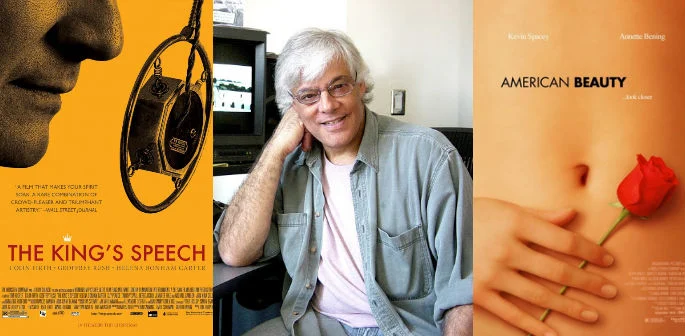
Get Video Editing Tips, Tricks, and Guides Straight to Your Inbox
Tariq Anwar is no stranger to the cutting room. Over his 40-year career, he’s edited an assortment of films – from BBC documentaries to motion pictures among the likes of the Oscar-winning "American Beauty" (for which he also received a nomination), "The Good Shepherd", "Revolutionary Road", "One Night In Miami" and "Law Abiding Citizen".
Tariq Anwar - Oscar Nominated Director
Anwar used Lightworks to cut the King George VI drama, "The King’s Speech". Its exceptional storyline, paired with an extremely talented cast (Colin Firth, Geoffrey Rush, Helena Bonham Carter) made quite the impact – receiving multiple Oscar nominations including “Best Film Editing” for Anwar. In this exclusive interview, you can get to know the man behind the (editing) machine who helped bring so many industry defining films to life.
I was placed at the London School of Film Technique, but didn’t receive a grant – having already squandered a year at Sir John Cass College of Further Technology, working toward a General Science degree.
Randomly, I answered an ad in London for a company called Libertas – they were looking for a driver. Libertas made documentaries and corporate films, and it was there that I got my union card.
While at Libertas - when I wasn’t parking cars or driving the company van - I worked on the floor as a third assistant director. An opportunity arose to work in the cutting room as an apprentice - which I immediately jumped on.
After working as an apprentice there for a year or two, I left Libertas to freelance as a second assistant editor and had the opportunity to work on a number of feature films before taking a two-month ‘holiday relief’ contract at the BBC.
The BBC was a great place to be. There was such a variety of work - from current affairs and light entertainment to children’s programs, music and the arts. It was just such a good environment, with an enormous number of talented staff technicians and a stream of gifted directors.
Also - there was little interference. A cut would pass through the director, the producer - and sometimes - the head of a department. There were no ‘other’ producers, executives, studio-heads, test-screenings, and focus groups – at all. The chances of being replaced by another editor were also very remote!
My first big break came in the early 90’s with producer, Brian Eastman. There can sometimes be snobbery about working in features as opposed to television, but Brian was prepared to give me a chance on a film called “Under Suspicion.” Following that, I was back on television productions until another producer, Stephen Evans, with whom I had worked with on television drama documentary, “Galahad of Everest,” gave me my second break on the feature-film “The Madness of King George.” It was then that I suddenly became accepted as a features editor.
I first used the Lightworks editing system in the early 90s on some television programs, but then it was later in 1994 when I first used it on a film called “The Grotesque.”
It’s the speed and ease of use. The timeline is clear and uncluttered; editing and trimming is achieved with a minimum of actions, the controller allows for a far greater ‘feel,’ and audio editing and mixing is light years ahead of anything offered by its competitors.
The most enjoyable thing for me is the shaping of a film after the assembly stage. It’s amazing how malleable it is during the editing process, and then to make the material work in a way that wasn’t intended - either by luck or by judgment - is very exciting. Also, I love editing with a full FX track and temp music. Finding the right score and the appropriate place to use it is a great part of the picture cutting process.
There are many favourites - all to do with the working relationship with the director, rather than the success after release. I love music and dance and the closest I got to cutting in that genre was “Center Stage” for Nick Hytner.
I think it’s important to be adventurous in editing and to take risks, but you can only achieve that if you have the director’s confidence, as well as confidence in your own ability to take criticism and rejection. I never saw myself as a confident person, but that confidence has certainly been built over the years with experience.
I don’t think there has been anyone, specifically – however, the BBC was the best training ground. The variety of the work, the very short schedules, dealing with different directors and their varying personalities, was all very good preparation.
It’s difficult to persuade someone who has become used to a system to change, particularly when the industry - meaning studios, facility houses and film schools - have invested so much into installing specific equipment.
Users may be smaller in numbers, but we all have an almost evangelical enthusiasm for Lightworks. Hopefully, that enthusiasm will rub off and persuade non-users to try it. I’ve edited with the other major systems, so I can say - from experience - that Lightworks is a far superior editing tool.